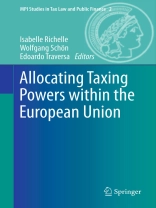The contributions to this volume try to overcome the traditional approach of the judicature of the European Court of Justice regarding the application of the fundamental freedoms in direct taxation that is largely built on a non-discrimination test. In this volume, outstanding authors cover various aspects of the national and international tax order when European law meets domestic taxation. This includes testing traditional pillars of income taxation – ability-to-pay, source and residence, abuse of law, arm’s length standard – with respect to their place in the emerging European tax order as well as substantial matters of co-existence between different tax systems that are not covered by the non-discrimination approach such as mutual recognition, cross-border loss compensation or avoidance of double taxation.
The overarching goal is to flesh out the extent to which a substantive “allocation of taxing powers” within the European Union is on its way to a convincing overall framework and to stretch the discussion “beyond discrimination”.
Tabela de Conteúdo
A.G. Prats: Revisiting ‘Schumacker’: Source, Residence and Citizenshipin the ECJ Case Low on Direct Taxation.- M. Greggi: Revisiting ‘Schumacker’: The Role of Limited Tax Liability in EU Law.- D. Gutmann: How to avoid Double Taxation in the European Union?- W. Schön: Transfer Pricing, the Arm’s Length Standard and European Union Law.- I. Richelle: Cross-Border Loss Compensation: State and Critique of the Judicature.- T. Hackemann: Group Taxation in the European Union.- V.R. Almendral: Tax Avoidance, the ‘Balanced Allocation of Taxing Powers’ and the Arm’s Length Standard: and odd Threesome in Need of Clarification.- E. Traversa, B. Vintras: The Territoriality of Tax Incentives within the Single Market.- E. Reimer: Taxation – an Area without Mutual Recognition?












